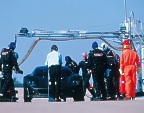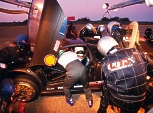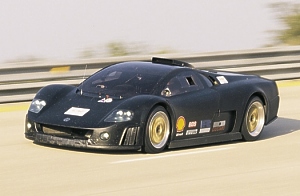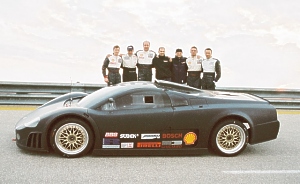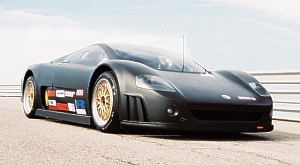
.
. .
..
. . . . .
Volkswagen Concepts Volkswagen Cars Related Topics:
© 1998 - 2006
Copyright & |
Volkswagen : W12 Testdrive The W12 Coupé - The 2001 record-breaking drive at Nardo
While there is already a chilly autumn breeze blowing over Volkswagen's Ehra-Lessien proving ground near Wolfsburg in northern Germany, the summer temperatures continue 2 000 km further south in Nardo close to Lecce, Italy. Shimmering currents of air hang over the hot asphalt. The hazy silhouette of a sports car comes into view. Only a few days earlier it had been doing high-speed laps of the track at Ehra-Lessien. Now the two-seater is waiting to unleash its 620 newton metres torque and maximum power of 440 kW (600 bhp) with perfect roadholding on the Nardo high-speed circuit. It is a W12 Coupé from Volkswagen, a prototype, a sports car nearing readiness for production, a world record test vehicle. In five minutes it will begin a roughly 7 000-kilometre (4 350-mile), 24-hour race against the clock. Within this mid-engine, monocoque construction coupé, just in front of the rear axle, lurks a 5 998 cm3 W12; the same engine that will power not only the production version of the Coupé, but also - with a modified power output of 309 kW / 420 bhp - the new luxury saloon and an equally new, high-class off-road vehicle from Volkswagen. Nardo in October 2001 is to be the final testbed for this engine and its enormous power output. Moreover, one thing is for sure: this gruelling test run will provide technical findings which in the normal development cycle would "cost" one year and not 24 hours. 15.55 h The team of mechanics, engineers, and FIA monitors (Federation Internationale de l'Automobile) leave the "start-finish straight" of the 12.6-kilometre circuit (7.8 miles). The independent men of the FIA have taken a break from Formula 1 duties for this weekend to accompany a record bid in which the W12 Coupé will lap at almost top speed day and night on the high-speed circuit at Nardo. In order to be officially recognised, record-breaking drives must be documented and confirmed by FIA observers.
Six international records also stand to be broken in category A, group 2, class 10 for non-boosted petrol engines of capacity 5 000 cm3 to 8 000 cm3. Little does anyone realise at this point, that by the time the project "Nardo 2001" is complete, a total of nine records will have fallen in Italy. 15.58 h The starting signal is given. Professional racing driver, Dieter Depping selects first gear of the sequential six-speed gearbox and tears off. In less than 3.5 seconds he reaches 100 km/h (62 mph). The Volkswagen project manager for the W12 Coupé, Rudolf-Helmut Strozyk, has the first telemetry data on his computer in the pit lane. Everything is looking OK. In the starting phase Depping unwinds the engine to a maximum of 5 800 rpm. The 24-hour countdown is running. After on hour the driver takes the engine up to 6 200 rpm; the sports car's speed stabilises at 319 km/h (198 mph). 16.58 h The first international record falls with apparent ease: one hour at an average speed of 310.99 km/h (193.24 mph). The old best ever speed, set in a Ferrari 550 Maranello, was 301.24 km/h (187.18 mph) and, as we know today, it stood for almost exactly three years. Shortly afterwards comes the first driver change. Jean-Francois Hemroulle is due to take the wheel. The W12 enters the pit lane and decelerates with its Brembo brake system to within a centimetre of the defined service point just in front of the mechanics. Now everything must go smoothly just like in Formula 1. The pit stop is scheduled to last 30 seconds. But unlike in the top league of motor racing, the tyres do not have to be changed. On the other hand, the drivers change over every time the car stops in the pits. The car is refuelled via a special fuel tank valve. The tank holds up to 255 litres and can be filled, if necessary in 24 seconds. In 29 seconds it is done; everything has been checked, refilled, and changed and the supercar roars back into the circuit at maximum acceleration. At Nardo there is no Formula 1-style pit lane speed limit. 17.35 h Volkswagen has now claimed a second international record in FIA group A, class 2. Cheers in the pit lane: never before has a car in this class been driven for an uninterrupted "500 kilometres" (311 miles) at an average of 307.64 km/h (191.16 mph). The previous record holder over this distance was a Corvette averaging 276.60 km/h (171.87 mph). Hemroulle comes in over the radio joking: "At over 300 km/h in these curves the forces are pushing you into the seat as if you were launching a space shuttle. It would be impossible to take your hand off the wheel, even if you were mad enough to try. That's what I call centrifugal force." 18.34 h Shortly after sunset the third international speed record for the class is broken: "500 miles" at an average speed of 308.81 km/h (191.89 mph). And this is by a car running on production standard Pirelli tyres. 19.10 h After exactly "1 000 kilometres" (621 miles) Volkswagen has also taken the record for this distance, thanks to an average speed of 311.09 km/h (193.30 mph). Shortly afterwards the driver is changed again. It is routine, but this time a larger-scale check. One minute and 17 seconds later the W12 Coupé is back on the track and tearing into the night. 21.07 h Less than an hour after the last fuel stop the pit crew tells the driver by radio that he has just bettered the fifth record of the day: "1 000 miles" at an average of 311.51 km/h (193.56 mph); the old record was some 30 km/h (19 mph) slower. Night falls. No Formula 1 chicanes, but banked curves, power steering, ESP, and perfect sports seats - sounds like a cushy job. But that it definitely isn't. At over 300 km/h (186 mph) the centrifugal force in the high curves puts a major strain on the driver's body and in the dark his eyes are also tested to the limit as he strives to keep the car on the ideal line for every metre of the circuit. 21.58 h The efforts are rewarded. While still maintaining an average speed of 311.58 km/h (193.61 mph), the W12 Coupé charges through the 6-hour mark to notch up the sixth successive record for Volkswagen.
Thus far, the night has brought no unpleasant surprises. With steady determination, the W12 Coupé closes in on the next records. But just after 04.00 h it happens: Dieter Depping senses a slight change in the car's handling followed by a hard thud underneath the car. Depping crawls into the pits. The damage is plain to see: the rear diffuser is missing. The part, which broke off, was then run over in the subsequent lap. The W12 Coupé has taken severe punishment to its front spoiler and the underbody. The repairs cost some 40 minutes and take several km/h off the average speed. But soon the race against time is underway again. 06.42 h The sun has risen just an hour ago. The drivers have so far covered 4 300 kilometres (2 672 miles) in the W12 Coupé. Despite the unscheduled pit stop, the average speed has improved again slightly and is currently 292.4 km/h (181.7 mph). The development team is already sure of one thing: "Nardo 2001" is a great success. Not just because of the records, but rather because of the impressive demonstration of how robust and W12 engine and the overall vehicle technology are, even in this prototype stage. As we move into morning the seventh record approaches. But the short time till then seems like an eternity. The sleepless night has taken its toll on the team. The amazing thing is that the drivers are still on top form. 08.53 h Dieter Depping had again been keeping his foot pressed firmly down. As a result, the W12 Coupé reaches the first world record mark earlier than expected: "5 000 kilometres" (3 107 miles). Meantime the speed has settled down at 295.44 km/h (183.58 mph). Not bad over a period of 17 hours. The previous record set in an LTS Corvette, was 282.78 km/h (175.71 mph). The record and the morning sun breaking through lifts the mood of all involved. But instead popping champagne corks, only cans of cola are being cracked open in the pit lane and most people are more in the mood for a coffee anyway - 24 hours will not be up until 15.58 h. Project manager Strozyk is confident about the remaining hours: "Even after 5 000 kilometres all figures from the engine of the W12 Coupé are at normal level. Having said that, we did make a real effort to eliminate every risk by intensive development work. That even applies to the lubricants. That is why I'm so pleased to have such a competent collaboration partner as Shell at our side for our long-distance world record bid. Shell not only provided excellent oils and its extremely high-performance fuel Optimax, but also assisted with analyses and consulting during the tuning work." The Volkswagen supercar continues to eat up the kilometres and shortly after the mechanics' lunch it roars through the 6 000-kilometre mark (3 728 miles). 15.43 h At the 7 000-kilometre point (4 350 miles) the last 17 tense minutes of the eventful 24 hours begin. The mood is like that of the final stage of a Formula 1 race: victory in sight, but right up to the last bend something could still go wrong. And that happens often enough in motor sport. Even the FIA monitors appear nervous. Everyone's eyes are on their watches. The hands seem to be as heavy as concrete. 15.58 h They have done it: after 7 085.7 kilometres (4 402.8 miles) and exactly 1441.24 minutes Dr Martin Winterkorn, Member of Volkswagen AG Board of Management waves the flag for the completion of the "24-hour race" against the clock. That meant that the second world record has been broken - 24 hours at average speed of 295.24 km/h (183.45 mph). A world record across all classes. Also a record that had stood for eleven years. And a new record that will probably not be bettered for some time. A record that is proof that Volkswagen's new W12-engines have passed their baptism of fire with flying colours. But the chequered flag was accompanied by the signal for the driver to go for speed. The reason: even after 24 hours the engine is running so well, the Chairman of the Board of Management of Volkswagen AG, Dr Ferdinand Piëch, gives the green light for the project "Nardo 2001" to continue. The new goal: to crack the world record over 5 000 miles. At around 19.32 h this is achieved with an average speed of 291.87 km/h (181.36 mph) (previously 279.69 km/h (173.79 mph)). Now the champagne does come out, especially as the class record for 12 hours had already been broken in a trial run. The W12 has written its first chapter in the book of automotive history. all photos: Volkswagen
|
.
|











